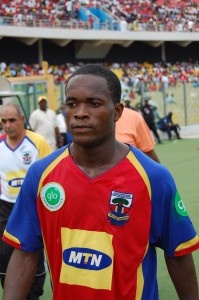
The Professional Footballers Association of Ghana (PFAG) has hit out at corporate Ghana for failing to use local/ home-based athletes as brand icons or ambassadors.
Mr Augustine Arhinful, former Black Stars player and member of PFAG, welfare body of footballers in Ghana, in an interview with The Finder said many corporate bodies in Ghana were too focused on what they could derive out of brand icons and as a result did not use the local athletes.
"Maybe they think the local league is not attractive so they don't want to use the player; who play in it. They prefer the Muntaris, Essiens and Stephen Appiahs as brand icons or brand endorsers to the local player but in life sometimes if you don't lose, you never win," he said.
The ex-Black Stars striker believes even though companies needed the most established brand icons or ambassadors, they could start using some local talents because some were indeed worthy of being brand icons. "I don't think the players are to be blamed. We are not forcing any company to at all cost use home based athletes as icons but it appears the companies fancy using the musicians, actors and actresses," he said.
In an era where endorsement deals have become a major income stream for many athletes worldwide, same cannot be said of local athletes here in Ghana. Even though most home-based footballers and athletes in general earned meagre sums as salaries, their capacity to seek alternative income using their "images" was not manifested with regard to corporate Ghana.
Michael Essien, Stephen Appiah and Asamoah Gyan are some of the few foreign-based sports men (athletes) who have earned endorsement deals with telecom giants MTN and Globacom in Ghana.
The Finder's investigations in the United Kingdom revealed that Chelsea and Black Stars midfielder, Michael Essien, earns in the region of $300,000 annually endorsing the MTN brand while Asamoah Gyan earns something in the region of GH¢ 130,000 endorsing GLO.
Speaking to The Finder in his personal capacity as a sports enthusiast, GFA legal committee member, Mr Prosper Harrison Addo, said while corporate Ghana would have no problem choosing a local or ‘home-based’ athlete as a brand icon; it was up to the athletes to excel and project themselves in a manner which appeal to corporate entities.
“A company wants to associate with personalities and brands with some level of brand value or pedigrees like that of the company which seeks to use the icon. Again most of the athletes in Ghana do not see themselves as brands and therefore lose out on potential deals,” he said.
Mr Addo said one thing that hampered the chances of home-based athletes from acquiring endorsement deals was the fact that the athletes did not have managers with the requisite managerial acumen to project them in these modern areas of sports.
"What we have are philanthropists who support the players financially being paraded as managers," Mr Addo added.
He noted that companies would only align themselves with icons that would add value to their brand equity or improve the brand capital.
He explained that there were various pressures on resources of corporate Ghana, a reason most home-based athletes do not get endorsement deals, "So the question is what do you bring to the table?" he asked.
From a footballer's perspective, Hearts of Oak's midfielder, Esme Mends believed the system was to be blamed for the phenomena.
He said that unless the local league was made attractive, home-based players can only dream about mega endorsement deals.
"I can't blame the companies because the system is too bad and unprofessional. The companies want to make money when they use your image but the truth is that local players can hardly give the companies the returns,"
He said until local footballers can live a decent life comparable to foreign players, the status quo regarding who became a brand icon would remain.
"I may be Esme Mends in Ghana but if you compare me to Essien, he is a bigger and better exposed player. When local and foreign players come together you can tell the difference and sometimes you can tell that the home-based athletes are feeling inferior," he said.
The Hearts of Oak midfielder however believes all is not lost because a change in attitude and a more professional approach from sports administrators and athletes themselves could reverse the trend.